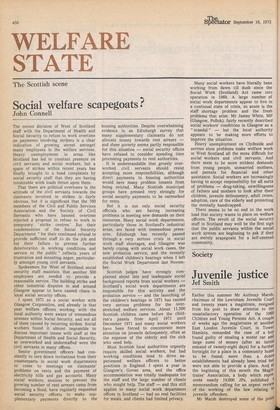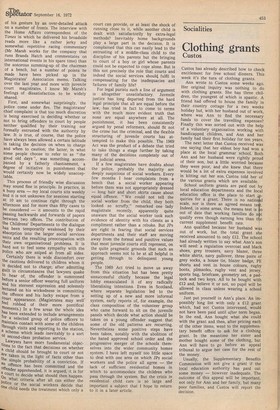Society
Juvenile justice
Jef Smith
Earlier this summer Mr Anthony Marsh, chairman of the Lewisham Juvenile Court and twenty years a magistrate, resigned from his post to draw attenton to the unsatisfactory operation of the 1969 Children and Young Persons Act. A couple of weeks ago the magistrates at another East London Juvenile Court, in Tower Hamlets, remanded the case of a boy found guilty of stealing a motor car and large sums of money (after an initial remand of twenty-eight days) for a further fortnight for a place in a community home to be found; more than a dozen establishments had already been tried but were not able to provide a place. And at the beginning of this month the Magi' trates' Association, a body which repre' sents nearly 19,000 JPs, published 3, memorandum calling for an urgent revieli of the working of the law relating t° juvenile offenders.
Mr Marsh destroyed some of the point of his gesture by an over-detailed attack on a number of fronts. The interview with the Home Affairs correspondent of the Times in which he delivered his broadside reads more like a rather jerky and somewhat repetitive racing commentary (Mr Marsh works for the company that runs Brands Hatch and commentates on international events in his spare time) than the sonorous summing-up of the chairman of a bench, but a number of points he made have been picked up in the Magistrates' Association memo. Talking over the last year and more with juvenile court magistrates, I know Mr Marsh's feelings of dissatisfaction to be widely shared.
First, and somewhat surprisingly, the police come under fire. The magistrates' chief complaint is that too much discretion is being exercised in deciding whether or not to bring offenders to court by people neither qualified by their training nor formally entrusted with the authority by law. It is true, of course, that the police have always been allowed a certain latitude in taking the decision on when to charge and when to caution; the latter, in what some people choose to refer to as "the good old days ", was something accompanied by a fatherly chastisement, a degree of initiative in punishment that would certainly now be widely unacceptable.
This process of friendly wise discussion may sound fine in principle. In practice, in a busy area — my local courts sits weekly and it is not unknown for sessions starting at 10 am to continue right through the afternoon and for more than fifty cases to be considered — it amounts to the rapid Passing backwards and forwards of papers between two offices. The contribution of the Childrens' Departments to the dialogue has been temporarily weakened by their absorption into the larger social services units and the resulting preoccupation with their own organisational problems. It is hard not to feel some sympathy with the Police who are sniped at from all sides.
Certainly there is wide discomfort over the cautions delivered to children whom it is decided not to charge; after admitting guilt in circumstances that lawyers quake to hear of, the offender is summoned before a senior officer wearing full uniform and his sternest expression and solemnly lectured on his wickedness in committing the offence and his lucky escape from a Court appearance. (Magistrates may well" feel robbed of their more pontifical moments.) In a few areas the whole idea has been extended to include arrangements or a selected group of police officers to Maintain contact with some of the children through visits and reporting to the station, a scheme which leads inevitably to a sort Of second-class probation service.
• Lawyers have more fundamental objections. to the fact that decisions on whether a child should be brought to court or not are taken in the light of facts other than the simple probability of a conviction. If an offence has been committed and the offender apprehended, it is argued, it is for a_ court to decide what should then happen. un. what criteria after all can either the Police or the social workers decide that one child needs the treatment which only a
court can provide, or at least the shock of running close to it, while another child is dealt with satisfactorily by extra-legal methods? Inevitably home backgrounds play a large part in the decision. It is complained that this can easily lead to the entrusting of a middle-class child to the discipline of his parents but the bringing to court of a boy or girl whose parents could not be expected to cope alone. But is this not precisely the role that courts and indeed the social services should fulfil in compensating for the inadequacies and failures of family life?
For legal purists such a line of argument is altogether unsatisfactory. Juvenile justice has long departed from the hard legal principle that all are equal before the law, has tried in fact to come to terms with the much more evident truth that none are equal anywhere at all. The punishment, it has been consistently argued by penal reformers, should fit not the crime but the criminal, and the flexible structuring of juvenile courts has attempted to make this possible. The 1969 Act was the product of a debate that tried to take things a stage further by taking many of the decisions completely out of the judicial arena.
If a few magistrates have doubts about the police, probably the majority are deeply suspicious of social workers. Every few months I hear complaints from a bench that a social worker appearing before them was not appropriately dressed — long hair and short skirts cause about equal offence. "We could not tell the social worker from the child, they both looked so scruffy," remarked one lady magistrate recently, apparently quite unaware that the social worker took such evidence of identity with his clients as a compliment rather than a rebuke. But JPs are right in fearing that social services departments and their staff are moving away from the formal and punitive values that most juvenile courts still represent, on the quite pragmatic grounds that such an approach seems not to be at all helpful in getting through to delinquent young people.
The 1969 Act tried to move us away from this situation but has been pretty unsuccessful chiefly because the legal lobby emasculated it of any radically liberalising intentions. Even in Scotland, where separate legislation led to the setting up of a new and more informal system, early reports of, for example, the class composition of the volunteer group who came forward to sit on the juvenile panels which decide what action should be taken on a young offender suggest that some of the old ' patterns are recurring. Nevertheless some positive steps have been taken, notably with the abolition of the hated approved school order and the progressive merger of the schools themselves into the wider community homes system. I have left myself too little space to deal with one area on which JPs social workers and the police all agree — the lack of sufficient residential homes in which to accommodate the children who pass through the system. But the crisis in residential child care is so large and important a subject that I hope to return to it in a later article.



































 Previous page
Previous page